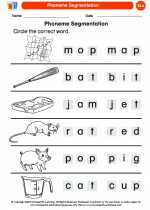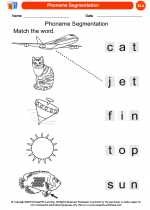Phoneme Segmentation
Phoneme segmentation is the ability to break words down into individual sounds, or phonemes. It is an important skill in developing phonemic awareness, which is the understanding that words are made up of individual sounds and the ability to manipulate those sounds.
Why is Phoneme Segmentation Important?
Phoneme segmentation is a crucial skill for early readers and writers. It helps children understand the alphabetic principle, which is the relationship between letters and sounds. By segmenting words into their individual sounds, children can begin to understand the spelling and pronunciation of words.
How to Teach Phoneme Segmentation
There are several strategies that can be used to teach phoneme segmentation to young children. These include:
- Clapping or tapping out the sounds in words
- Using manipulatives, such as counters or blocks, to represent each sound in a word
- Playing games that require children to isolate and identify individual sounds in words
Study Guide
Here are some activities and questions to help reinforce the concept of phoneme segmentation:
Activities:
- Ask the child to clap the sounds they hear in a word (e.g. "cat" would be clapped as /c/ /a/ /t/).
- Provide a set of objects and ask the child to match each object with the corresponding number of sounds in its name (e.g. "cat" would be matched with 3 objects).
- Play a game where the child has to identify the first, middle, or last sound in a word.
Questions:
- What is phoneme segmentation?
- Why is phoneme segmentation important for early readers?
- Can you think of a word and break it down into its individual sounds?


